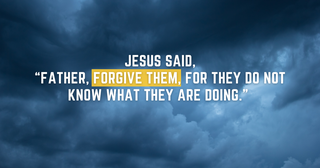“Father, Forgive Them” - The Meaning of Jesus’ Incredible Request on the Cross
Share

Jesus said, “Father, forgive them, for they do not know what they are doing.” (Luke 23:34)
Would you allow yourself to stand in Jesus’ shoes for a moment? You are an innocent person sentenced to a death reserved for the worst criminals… and the words that come out of your mouth are, “Father, forgive them.” Of all the things I would think about saying to the people leading the charge in my execution, “Father, forgive them” would be the furthest thing from my mind. Yet this is what Jesus did.
This makes you wonder why Jesus said, “Father, forgive them.” How could he say such a thing? The answer tells us everything we need to know about who Jesus is and provides a framework for how we should view those we perceive are against us.
Photo credit: ©Getty Images/Tinnakorn Jorruang
When Did Jesus Say “Father Forgive Them”?

When Jesus was crucified, he was taken to a place called the skull and was crucified between two criminals. At some point during this time, he said, “Father, forgive them.” Luke is the only gospel that records Jesus saying these words. Luke also happens to identify these as the first words Jesus said on the cross. There are some debates over this verse because some o ancient manuscripts do not include this saying, while others do. Some believe it was added as part of the early church oral tradition. However, Luke is generally regarded as a great historian who researched carefully, not just relying on what others said about Jesus.
Another interesting factor points to these words’ authenticity: Luke wrote the book of Acts and this gospel. In Acts, Luke included a similar statement when Stephen dies by stoning.
“While they were stoning him, Stephen prayed, ‘Lord Jesus, receive my spirit.’ Then he fell on his knees and cried out, ‘Lord, do not hold this sin against them.’ When he had said this, he fell asleep.” (Acts 7:59-60)
Stephen appears to be echoing what Jesus said—something he had either heard Jesus say that day or had heard other followers mention. By echoing Jesus’ words, Stephen followed the example Jesus set before him.
Photo Credit: ©Getty Images/1971yes
Did Jesus Really Forgive His Tormenters?

It is important to note that Jesus did forgive his tormentors. There is an important reason why it matters. Jesus had previously demonstrated the ability to forgive sin while he was on the earth. For example, he forgave the woman caught in adultery (Jn. 8:1-11) and the paralyzed man whose friends brought him to Jesus (Matt. 9:1-8).
When Jesus was before Pilate after being handed over by the chief priests and the elders, Pilate brought him before the crowds. He knew Jesus was innocent and was handed over to serve the religious leaders’ interests. During this time, Pilate offered them the option to release Barabbas or Jesus. The crowd said to release Barabbas and crucify Jesus. Please note Pilate’s reactions and the crowd’s response.
“When Pilate saw that he was getting nowhere, but that instead an uproar was starting, he took water and washed his hands in front of the crowd. ‘I am innocent of this man’s blood,’ he said. ‘It is your responsibility!’ All the people answered, ‘His blood is on us and on our children!’” (Matthew 27:24-25)
The chief priests, the elders, and those in the crowd took responsibility for Jesus’ death. Essentially, they said, “charge his death to our account and the accounts of our children.” This text has been (incorrectly, I might add) used over the years as a proof text to justify many of the horrible things Jews have experienced over the years. Since the ones calling for his execution were Jews, they were getting payback for their sin. However, Luke’s gospel destroys that position. When Jesus was on the cross, he forgave them. This means he forgave every person who desired his death and who participated in his death. He forgave the Jews who called for his death. He forgave the Romans who nailed him to the cross. He even forgave every chief priest, elder, and crowd member shouting for his death while placing its responsibility on their heads. Jesus forgave them, which means they were not held guilty for his death. The truth is he didn’t die because they willed it anyway. He died because he allowed it.
“The reason my Father loves me is that I lay down my life—only to take it up again. No one takes it from me, but I lay it down of my own accord. I have authority to lay it down and authority to take it up again. This command I received from my Father.” (John 10:17-18)
The people who sent Jesus to the cross y may have thought they were the reason for his death. While they played a role, they were not held guilty for killing him. He was responsible for laying down his life. When he forgave them, their accountability for his death was completely forgiven.
How Could Jesus Forgive Those Who Killed Him?

The fact Jesus could forgive even the people who arranged and carried out his death points to his character. Throughout history, some surprising people have found faith in Jesus. Vengeful persecutors meet Jesus on the road to Damascus and become great evangelists. Hardened criminals encounter Jesus in prison and develop genuine faith. Because of his mercy and grace, Jesus forgives them all. Jesus died on the cross carrying the world’s sins, including yours and mine. Since he was paid the penalty for it all, he can offer forgiveness for it all. We each deserve to hang on a cross for our sins. He took our place. The forgiveness he offered then is the same forgiveness he offers now. Before we ask, “how could Jesus forgive that person?” we should start with, “how could Jesus forgive me?”
Photo Credit: ©iStock/Getty Images Plus/gabrielabertolini
Why Did Jesus Say, “They Know Not What They Do”?

When you look at the people who wanted Jesus dead, it’s clear they thought they were removing a nuisance. They set up a sham trial to try and present evidence against Jesus that would lead to the death penalty. Even though they had many false witnesses come forward (Matt. 26:60), they couldn’t levy one charge against him because there was none. Eventually, they convicted him because he told them the truth about who he was (Matt. 26:64-66).
They thought they were removing someone who sought their earthly authority. They considered Jesus a threat seeking to establish a worldly kingdom. They missed the purpose of Jesus’ life and ministry. Because they missed his purpose in life, they did not understand his purpose in death. Jesus was not dying because of them; he was dying for them. He didn’t come to remove the teachers of the law; he came to redeem them. Unfortunately for the chief priests and those in the crowd that day, they had no clue why Jesus was really dying. Because their sin was not based on knowledge but on error, Jesus could not only say, “Father forgive them,” but “Father, forgive them, because they don’t know what they are doing.”
The Jesus who died on the cross, and rose from the dead, is still willing to forgive today. He has not lost any amount of mercy or grace but is ready to pour it out on all who will call on him. His mercies are new every morning. You can be confident that if you ask, he will forgive. After all, if he could forgive the ones who set him up for death on a cross and those who nailed him to the cross, he can certainly forgive you.

He is the author of The Pursuit of Purpose, which helps readers understand how God leads them into his will, and the author of The Pursuit of Victory: How To Conquer Your Greatest Challenges and Win In Your Christian Life. Clarence is also committed to helping 10,000 people learn how to study the Bible and has released his first course, Bible Study Basics, to achieve that goal. To learn more about his ministry and resources, please visit clarencehaynes.com.